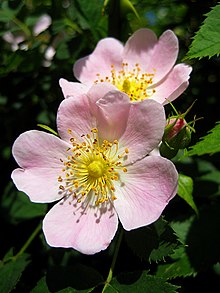Dog rose
| Rosa canina | |
|---|---|
 |
|
| Rosa canina flowers are sometimes pink | |
| Scientific classification | |
| Kingdom: | Plantae |
| (unranked): | Angiosperms |
| (unranked): | Eudicots |
| (unranked): | Rosids |
| Order: | Rosales |
| Family: | Rosaceae |
| Genus: | Rosa |
| Species: | R. canina |
| Binomial name | |
|
Rosa canina L. |
|
| Synonyms | |
|
See text |
|
See text
Rosa canina, commonly known as the dog-rose, is a variable climbing, wild rose species native to Europe, northwest Africa, and western Asia.
It is a deciduous shrub normally ranging in height from 1–5 metres (3.3–16.4 ft), though sometimes it can scramble higher into the crowns of taller trees. Its stems are covered with small, sharp, hooked prickles, which aid it in climbing. The leaves are pinnate, with 5-7 leaflets. The flowers are usually pale pink, but can vary between a deep pink and white. They are 4–6 centimetres (1.6–2.4 in) in diameter with five petals, and mature into an oval, 1.5–2-centimetre (0.59–0.79 in), red-orange fruit, or hip.
From DNA analysis using amplified fragment length polymorphisms of wild-rose samples from a transect across Europe (900 samples from section Caninae, and 200 from other sections), it has been suggested that the following named species are best considered as part of a single Rosa canina species complex, and are therefore synonyms of R. canina:
The plant is high in certain antioxidants. The fruit is noted for its high level of vitamin C, and is used to make syrup, tea, and marmalade. It has been grown or encouraged in the wild for the production of vitamin C from its fruit (often as rose-hip syrup), especially during conditions of scarcity or during wartime. The species has also been introduced to other temperate latitudes. During World War II in the United States, Rosa canina was planted in victory gardens, and can still be found growing throughout the country, including roadsides and in wet, sandy areas along the coastlines. In Bulgaria, where it grows in abundance, the hips are used to make a sweet wine as well as tea. In the traditional Austrian medicine, Rosa canina fruits have been used internally as tea for treatment of viral infections and disorders of the kidneys and urinary tract. The hips are used as a flavouring in Cockta, a soft drink made in Slovenia.
...
Wikipedia
